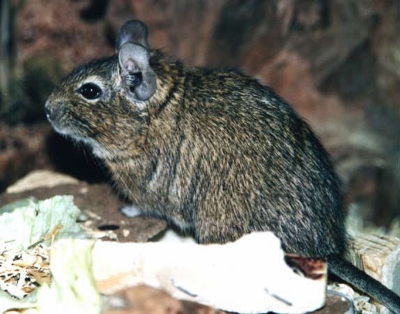
They’re exotic rodents that many people have never heard of before, but we hope that by featuring the degu as our Animal of the Month for March that you’re now more familiar with these wonderful little animals. If you missed any of our tweets about degus @ExoticPetVets, you can find them all here in a summary. Did you know?:
- The scientific name for the degu is Octodon degus, with “octodon” referring to their figure-8-shaped cheek teeth.
- Sometimes degus are referred to as “brush-tailed rats” or “trumpet-tailed rats,” but degus are not rats.
- In the wild, degus are found in Chile living on the lower western slopes of the Andes mountains.
- Degus dig elaborate burrows, which they use for shelter when they’re sleeping at night and to hide from predators.
- Degus are herbivores and eat plants, roots, seeds and fruit in the wild.
- In captivity, degus should eat guinea pig and chinchilla pellets + hay + veggies.
- Degus are prone to diabetes and should not be fed food that’s too fatty, like nuts and seeds, and/or sugary like fruit.
- The enamel in front of a degu’s incisors starts turning orange from birth into adulthood.
- It’s believed good nutrition plays a big part in why degu enamel turns orange. Pale incisors are a sign of poor nutrition.
- Degus are small mammals, but are larger than gerbils. Degus measure around 30 cms tip to tail.
- Degus have medium to dark-coloured brown fur and they have a tuft of fur on the tips of their tails.
- Degus are very vocal and highly social and live in groups in the wild.
- At least two degus should be kept together in captivity. If they’re alone, they can become anxious and unhappy.
- Degus can bond with people and they enjoy human interaction.
- Degus are intelligent and need stimulation from exercise and playing to be healthy and happy.
- Because they are burrowing animals, degus in captivity should be provided with an area in which to dig.
- Like chinchillas, degus need to take dust baths for healthy fur and skin.
- Offer degus a sturdy bowl with about a ½-inch of chinchilla dust a couple of times a week for their dust bath.

